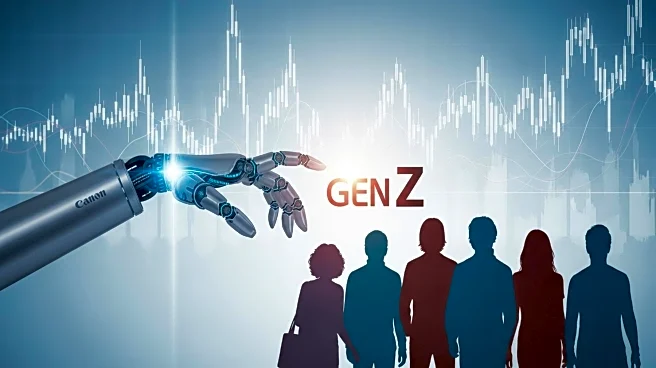What's Happening?
In 2025, unemployment among Gen Z Americans, particularly recent college graduates, has surged to 4.8%, surpassing the overall U.S. unemployment rate of approximately 4.0%. Federal Reserve Chair Jerome Powell has described the current labor market as a 'low firing, low hiring environment,' which disproportionately affects entry-level job seekers. This situation is exacerbated by a broader economic slowdown and an oversupply of college graduates competing for limited job opportunities. The number of Americans holding a bachelor's degree has increased significantly, leading to heightened competition for entry-level roles. Additionally, male Gen Z members face higher unemployment rates compared to their female counterparts, with male-dominated fields experiencing job cuts and hiring freezes.
Why It's Important?
The employment challenges faced by Gen Z have significant implications for the U.S. economy and society. The mismatch between the number of college graduates and available jobs could lead to long-term 'scarring effects,' potentially affecting lifetime earnings, homeownership rates, and wealth accumulation for young workers. The current hiring freeze and economic slowdown may hinder Gen Z's ability to secure stable employment, impacting their financial stability and career progression. This situation also highlights the need for policy interventions to address youth unemployment and support skill development, as well as the potential for generational shifts in attitudes toward higher education and career paths.
What's Next?
As the economic landscape evolves, potential policy responses could include incentives for hiring recent graduates, expansion of apprenticeship programs, and initiatives to bridge the skills gap. The Federal Reserve may adjust its monetary policy to prevent further economic slowdown, while educational institutions might revamp curricula to better align with industry needs. Additionally, Gen Z may increasingly turn to entrepreneurship and gig economy work as alternative career paths. The demographic shift with retiring Baby Boomers could eventually create more job openings for younger workers, offering hope for improved employment prospects in the future.
Beyond the Headlines
The Gen Z employment crisis underscores deeper societal and economic challenges, including the impact of automation and AI on entry-level jobs. While AI is not the sole cause of hiring difficulties, its role in reshaping the job market is significant. The decline in remote work opportunities also limits geographic flexibility for job seekers. Addressing these issues requires collaboration between educators, employers, and policymakers to ensure young workers are equipped with relevant skills and opportunities. The situation also calls for a reevaluation of the value of higher education and the need for more diverse career pathways.









